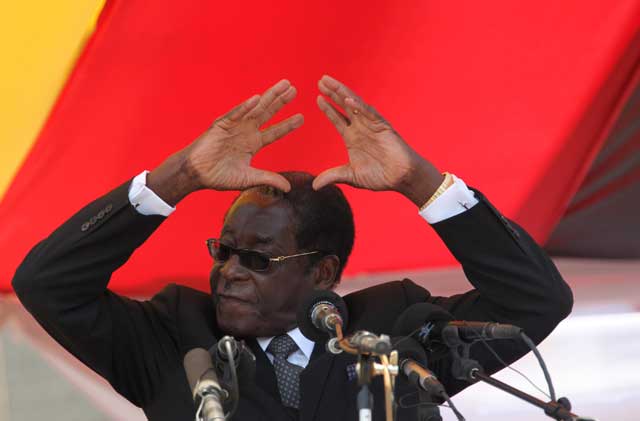The Fear: The Last Days Of Robert Mugabe, By Peter Godwin

Your support helps us to tell the story
From reproductive rights to climate change to Big Tech, The Independent is on the ground when the story is developing. Whether it's investigating the financials of Elon Musk's pro-Trump PAC or producing our latest documentary, 'The A Word', which shines a light on the American women fighting for reproductive rights, we know how important it is to parse out the facts from the messaging.
At such a critical moment in US history, we need reporters on the ground. Your donation allows us to keep sending journalists to speak to both sides of the story.
The Independent is trusted by Americans across the entire political spectrum. And unlike many other quality news outlets, we choose not to lock Americans out of our reporting and analysis with paywalls. We believe quality journalism should be available to everyone, paid for by those who can afford it.
Your support makes all the difference.I was carrying Peter Godwin's book across the lobby of a South African hotel when a beaming waitress, pointing to the picture of Robert Mugabe on the cover, stopped me to exclaim proudly: "That's my uncle!" But he's a bad man, I said. "This book shows the terrible things he has done, and is still doing." She clearly didn't believe me. "But it's just a book," she said, her smile fading. "He's really a good man."
It's not just a book – it is a devastatingly detailed on-the-ground chronicle of what Godwin sincerely hoped would be, as the subtitle says, "the last days of Robert Mugabe", which make the word "bad" rather inadequate.
Just before I encountered the waitress I happened to be reading of Godwin's visit to a hospital where some of the victims of Mugabe's savagery had sought refuge. "Inside we find dozens more victims," he writes. "One of their number died at the place they were beaten, they tell us, a torture camp they call Gum Tree Base. Another died here in this hospital, from his wounds. The rest were traumatised and terrified. They have been beaten on the soles of their feet, and on their buttocks – think of bone-deep lacerations with no skin left, think of being flayed alive. Think of swollen, broken feet, of people unable to stand, unable to sit, unable to lie on their backs because of the blinding pain. Husbands and wives have been cuffed and beaten alike. Their wrists still bear the scars."
This is just one example of the many such incidents discovered by Godwin on an undercover mission across the country where he was born, grew up in and on which he has written for the past 25 years.
Godwin and his sister Georgina, the wittiest and most observant of travelling companions, went to Zimbabwe secretly in the immediate aftermath of the election which Mugabe, after immense international pressure, agreed to hold in 2008. Despite blatant vote-rigging, intimidation and brutal killings of party organisers, Morgan Tsvangarai's Movement for Democratic Change (MDC) emerged as the winners. Godwin was on the first plane to Africa "to dance on Robert Mugabe's political grave".
Except he isn't buried yet: far from it. Mugabe refused the accept the result and soldiered on, grudgingly accepting the MDC as token members of the government he still dominates. Just last week, Mugabe coolly informed Tsvangarai, now serving as his impotent prime minister in a so-called "unity government", that he had unilaterally reappointed all 10 of Zimbabwe's serving provincial governors, all representing his Zanu-PF party.
He was, he said, the "executive" president and entitled to appoint whom he likes – a flagrant breach of the national constitution and the Global Political Agreement hammered out by foreign powers after the election. He has already illegally appointed the governor of the Reserve Bank, the attorney general, five judges, six ambassadors and a new Police Service Commission. Another political crisis, with all that means in terms of starvation, butchery and beatings, looms.
Having failed to dance on the grave, Godwin went across the country, visiting white farmers, terrified opposition leaders in hiding and even blood diamond miners who came within an ace of making him yet another victim of the ill-fated stones. His book is a beautifully written chronicle of his journey through his ravaged but still achingly beautiful homeland, detailing not just the tragedy of Mugabe's reign but also the hope and determination of the brave folk, including the remaining handful of white farmers, who still struggle on.
Mugabe is now 87, a bitter and ailing old man, determined never to relinquish power while he breathes. Godwin surmises that his biggest fear is of prosecution for war crimes, notably the mass murder of 20,000 Ndebele some 20 years ago (which Godwin reported). The trial of Charles Taylor of Liberia is an object example for him. Meanwhile, two million of his citizens are starving, two-thirds live on $1 a day and three million have fled across the Limpopo into South Africa (including his waitress niece). When will it all end? And what will be left? It's so very sad?
Join our commenting forum
Join thought-provoking conversations, follow other Independent readers and see their replies
Comments